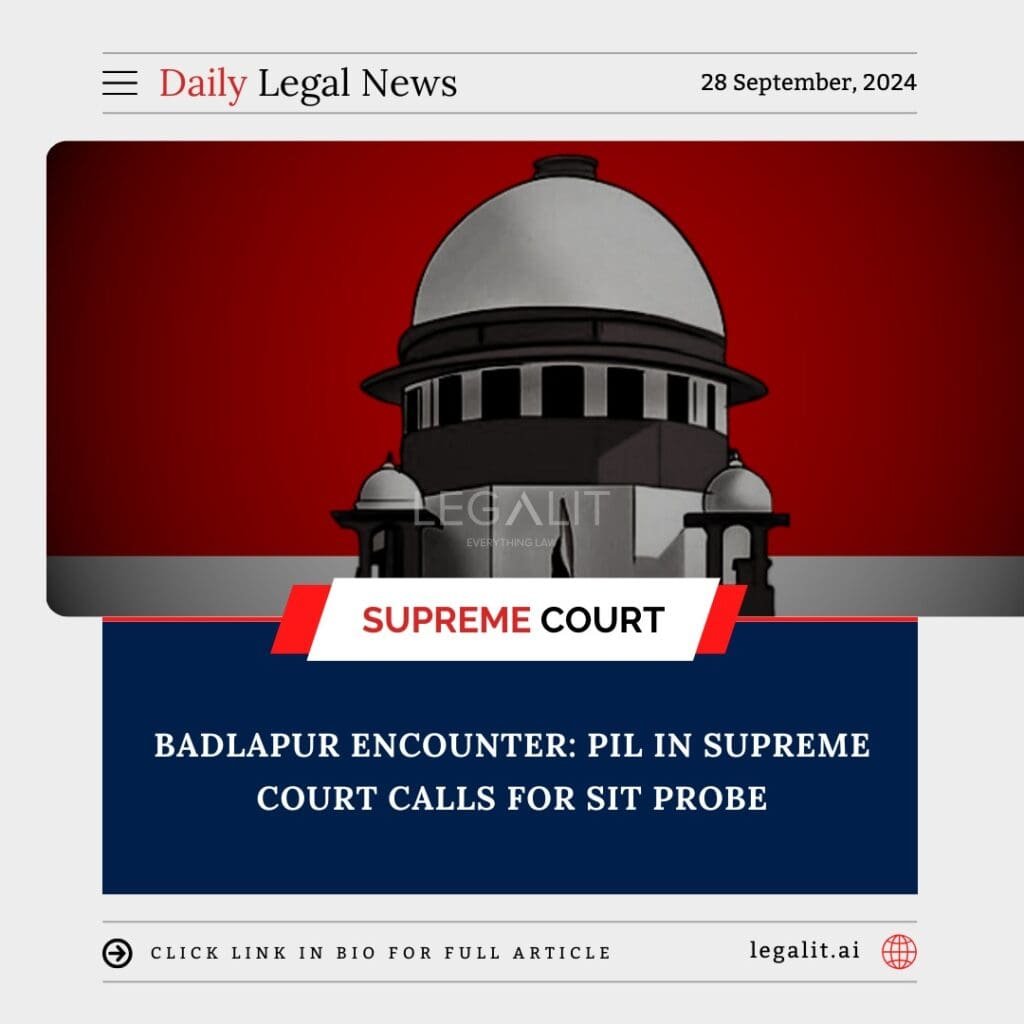
In the aftermath of the controversial Badlapur encounter, a Public Interest Litigation (PIL) has been filed in the Supreme Court, urging a Special Investigation Team (SIT) probe into the incident. The encounter, which resulted in the death of an accused in a sexual assault case, has sparked widespread debate about the legality of police actions, raising concerns over extrajudicial killings in India.
1. The Incident: What Happened in Badlapur?
The Badlapur case involved a brutal sexual assault that shook the region, and law enforcement quickly apprehended the accused. However, soon after his arrest, reports surfaced that the accused had been killed in an encounter with the police. The police maintained that the accused had tried to escape, forcing them to open fire, but the circumstances surrounding the event have since been questioned.
- Encounter Controversy: While some sections of society welcomed the swift action by the police, there was an immediate outcry from human rights groups and legal experts who expressed concerns over the possibility of the encounter being staged. The questions largely revolved around whether proper legal protocols were followed and whether the accused was denied a fair trial.
- Judicial Intervention: The incident came under judicial scrutiny as the Bombay High Court demanded clarity on the actions taken by the police. With the filing of a PIL in the Supreme Court, the case has now reached the highest level of the judiciary.
2. PIL Seeks SIT Probe
The PIL, filed by a concerned citizen, demands a thorough and independent investigation into the circumstances of the encounter. The petitioner has called for the formation of a Special Investigation Team (SIT) to probe whether the killing was a legitimate encounter or an extrajudicial killing carried out to bypass the legal process.
- Allegations of Misconduct: The PIL accuses the local police of violating the rule of law, arguing that they overstepped their authority in killing the accused without giving him a chance to prove his innocence in court. The petition asserts that such actions erode public trust in law enforcement and undermine the judiciary’s role in delivering justice.
- Need for an Independent Probe: Given the gravity of the situation, the PIL argues that only an independent body like an SIT can impartially investigate the matter. The petition emphasizes that the public deserves answers and that any deviation from the legal process must be investigated to maintain accountability within law enforcement.
3. Extrajudicial Killings: A Widening Concern
The Badlapur encounter is not an isolated incident. Across India, there have been multiple reports of police encounters that have raised red flags, with critics pointing out that such incidents bypass the justice system, denying suspects their right to a fair trial.
- Pattern of Encounters: The PIL highlights that encounters are becoming a pattern in many states, where law enforcement is accused of acting as judge, jury, and executioner. While many such incidents are justified on the grounds of self-defense, the absence of a proper judicial process raises concerns about the misuse of power.
- Human Rights Angle: Human rights organizations have long campaigned against extrajudicial killings, asserting that the rule of law must prevail over the impulse for instant justice. They argue that every accused has the right to be tried in a court of law, no matter how serious the crime.
4. Impact on the Justice System
The Badlapur encounter and similar incidents bring into question the integrity of India’s justice system. If such encounters continue without thorough investigations, it could lead to a breakdown in the rule of law, where police officers feel emboldened to act outside legal boundaries.
- Judicial Oversight: The Supreme Court’s intervention through this PIL will play a critical role in reaffirming the judiciary’s position on police encounters. A decision in favor of an SIT probe could set a precedent for how similar cases are handled in the future, ensuring greater accountability within law enforcement agencies.
- Public Perception of Justice: While the public often demands swift justice, especially in heinous crimes like sexual assault, extrajudicial killings pose a threat to the principle of due process. Upholding the rule of law, even in the most emotionally charged cases, is essential for maintaining a fair and just legal system.
5. Conclusion: Awaiting the Supreme Court’s Decision
The Supreme Court’s response to the PIL seeking an SIT probe into the Badlapur encounter will be closely watched by legal experts, human rights activists, and the general public alike. If an independent investigation is ordered, it could shine a light on the circumstances surrounding the accused’s death and bring clarity to whether it was a legitimate encounter or an unlawful killing.
This case serves as a reminder of the need for balance between swift justice for victims and the protection of fundamental rights for the accused, ensuring that the justice system remains fair, transparent, and accountable.